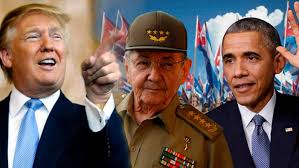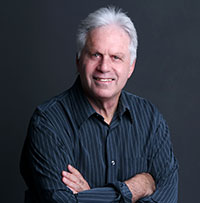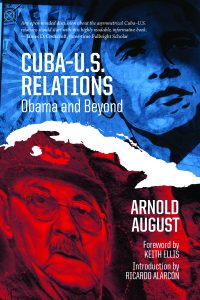By Arnold August, June 27, 2018.
This was one of the many themes that resulted in interest, discussion and debate during the 13-city book tour of England, Scotland and Wales from May 28 to June 13:
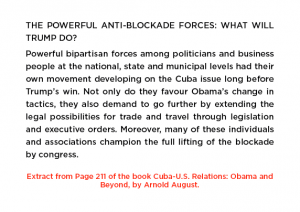
THE POWERFUL ANTI-BLOCKADE FORCES: WHAT WILL TRUMP DO?
Powerful bipartisan forces among politicians and business people at the national, state and municipal levels had their own movement developing on the Cuba issue long before Trump’s win. Not only do they favour Obama’s change in tactics, they also demand to go further by extending the legal possibilities for trade and travel through legislation and executive orders. Moreover, many of these individuals and associations champion the full lifting of the blockade by congress.
The above is an extract from Page 211 of the book Cuba-U.S. Relations: Obama and Beyond, by Arnold August.
The information and analysis from this subtitle of Chapter 5, entitled THE BLOCKADE: FROM OBAMA TO TRUMP, is proving to be correct and confirmed by events. Thus, this theme was expanded upon and updated as the talks progressed from one city to the other. It was of interest as a further stimulus to all those who are committed to fight for an end to the blockade. Positive news on the “American anti-blockade” theme of Cuba–U.S. events came to the surface so often during this short period while I was in the UK, that updates to my talk had to be regularly inserted.
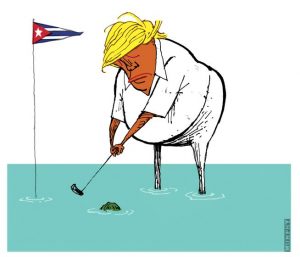
The following is a recapitulation of all the news. While not all of it derives directly from anti-blockade forces such as described in the publication (politicians and business people), in these cases it seems that U.S. government officials feel the political and economic pressure.
June 1, three days after the May 28 London inaugural of the two-and-half week tour.
You’ve got mail: Cuba, U.S. make permanent restored postal services
HAVANA (Reuters) – Cuba and the United States are making the re-establishment of postal services permanent after a trial run, the state-run Cuban News Agency reported on Friday, as cooperation in some areas inches forward despite a chill in relations under the Trump administration.
The former Cold War foes first restored direct mail service as a pilot program in December 2015 as part of the policy of detente pursued by former U.S. President Barack Obama with then Cuban President Raul Castro.
Since taking office in January last year, President Donald Trump has struck a more hostile tone towards the Communist-run island and has rolled back parts of the normalization of relations, making trade and travel more difficult once more.
But Trump has left in place key Obama-era changes such as restored diplomatic relations, regular flights from the United States and cruise ship visits. Bilateral talks continue on cooperation in areas of mutual interest such as security.
“The re-establishment of this service allows to send post in direct flights between Cuba and the United States,” the Cuban Post Office said in a statement.
Direct mail service between the United States and Cuba was suspended since 1963. Despite the ban, letters and other mail still flowed between the United States and the island nation 90 miles (145 km) away through other countries such as Canada, Mexico and Panama.
https://www.reuters.com/article/us-cuba-usa/
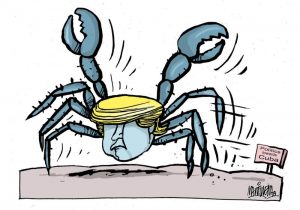
June 4
This short 2 minutes, 30 second YouTube was shown in some meetings where the technology permitted. Keep in mind that it is a report from Cuba and that Republican Jeff Flake is an important personality in US politics and an opponent of Trump, while Google first reached agreements with Cuba during the Obama administration.
Ready for some encouraging surprises? A must-view!
June 7
Southwest, United, JetBlue Expanding Flights to Cuba
By Matt Kendall
Three major US air carriers, Southwest Airlines, JetBlue, and United airlines, are expanding their flights to Cuba, following a decision by the US Department of Transportation to allow the expansions.
Southwest is launching a third daily nonstop flight between Fort Lauderdale-Hollywood International and Havana, effective August 8, 2018, the carrier announced in a release.
JetBlue is increasing its FTL-Havana flights up to three a week. The carrier will also be launching the first-ever nonstop flights between Boston and Havana in November.
United has already begun offering daily nonstop flights between Houston’s George Bush Intercontinental Airport and Havana’s Jose Marti International Airport, expanding on what had been Saturday-only service.
http://www.nearshoreamericas.com
June 8
Republican group works to open $2 Billion Trade Opportunity in Cuba
WASHINGTON D.C.- Members of Congress joined the Cuban Ambassador to the U.S., José Ramón Cabañas Rodríguez, to discuss the benefits of fostering bilateral agricultural and economic ties between Cuba and the United States.
U.S. Sen. John Boozman (AR), Rep. Rick Crawford (AR-1), Rep. Roger Marshall (KS-1), and Rep. Tom Emmer (MN-6) participated in the Congressional roundtable moderated by Engage Cuba on Thursday.
Members and the Ambassador focused on reciprocal trade between Cuba and the U.S. Cuba imports 80 percent of its food, creating an opportunity for American producers to take advantage of the country’s more than $2 billion market.
“With an open market to Cuba, Kansas could top $55 million in additional sales. While we are renegotiating our trade deals, we have a $2 billion market untouched right under our nose. It is time to throw support behind this mutually beneficial economic opportunity. It is through leadership in Congress, and discussions like this roundtable that we will begin to make these lasting changes,” Rep. Marshall (KS-1) said.
“American agricultural producers face significant commercial barriers to trade with Cuba. Lifting the ban on private banks and companies from offering credit for agricultural exports to Cuba will help level the playing field for our famers while exposing Cubans to American values and ideals,” Sen. Boozman (AR) said.
“For years the United States has had an estranged relationship with Cuba and for years we’ve seen no reversal in the tactics used by Cuba’s oppressive government. Trade with Cuba is a vessel that will create change in Cuba and bring economic opportunity to American farmers. Most Americans agree that it’s time to lift the embargo on Cuba and Congress needs to meet that desire by working to pass my bill, H.R. 525 and others like it,” Rep. Crawford (AR-1) said.
“I’m grateful to have participated in this important discussion. The time to begin renewing our relationship with our neighbors just 90 miles of the Florida coast is now. With American farmers suffering some of the lowest commodity prices we have ever seen, Congress has an opportunity to take action and make real change. The Cuba Agricultural Exports Act, sponsored by Rep. Crawford, would lift financing restrictions imposed by the embargo on agriculture exports. The result would be relief for our farmers and a first step toward redefining the American-Cuban relationship. While my bill, the Cuba Trade Act, accomplishes the ultimate goal or lifting the embargo completely, passing Rep. Crawford’s bill can, and should, happen immediately,” Rep. Emmer (MN-6) said.
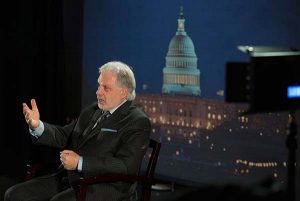
Arnold August
June 9
Cruise ship tourism on the rise
(Please note that not all the passengers are from the U.S. However, cruise ships are not banned by Trump, and there are loop-holes for American tourists to visit and spend in Cuba)
Cruise ship tourism is on the rise in Cuba. Last year the port of Havana received some 328,000 passengers, with 500,000 expected this 2018
Author: Julio Martínez Molina
Cruise ship tourism is on the rise in Cuba. Last year the port of Havana received some 328,000 passengers, with 500,000 expected this 2018.
Such figures reaffirm travelers’ confidence in Cuba as a safe and attractive tourist destination which – as of May 18, and despite the impact of Hurricane Irma, the tightening of the economic blockade imposed by the United States, and media campaigns aimed at deterring U.S. citizens from traveling to the island – had received two million international visitors.
The potential to develop cruise ship tourism also exists across other ports, such as Cienfuegos, a UNESCO World Heritage site, which attracts thousands of visitors every year who come to enjoy El Nicho waterfalls, the botanical gardens, or hiking excursions through the area’s breathtaking landscape.
Cruise ship tourism in Cienfuegos has gradually been developing over the last 20 years, with the Olympia Medina Terminal No.1, accustomed to receiving large-scale ships carrying some 1,300 passengers every week.
This modality not only benefits the province’s port facilities but also Cienfuegos’ historic center. For example, last year, a record 180 ships docked at the port, carrying a total 30,809 visitors. Meanwhile as of May 2018, the port had received 70 cruise ships.
As part of the development of this modality in Cuba, the port of Havana is scheduled to be expanded, with the creation on four new terminals by 2024.
A contract has been awarded to a Cuban-Turkish joint venture, responsible for administering and marketing the island’s most important port facility for a period of 15 years.
http://en.granma.cu/tourism/2018-06-12/

June 12, the second to last day of UK Tour.
Pennsylvania Leaders Launch Engage Cuba State Council
HARRISBURG, PENNSYLVANIA – Today (June 12) in Harrisburg, prominent leaders from across the Commonwealth launched the bipartisan Engage Cuba Pennsylvania State Council. The council will build statewide support for pro-engagement policies and urge Congress to lift trade and travel restrictions on Cuba that disadvantage Pennsylvanians and Cubans alike. Removing sanctions on Cuba could both expand opportunities for Pennsylvania businesses and empower the Cuban people. Pennsylvania is the 18th state to join Engage Cuba, a D.C.-based advocacy organization dedicated to advancing federal legislation to lift the embargo on Cuba.
“Removing trade restrictions on Cuba could bring new opportunities to Pennsylvania’s agriculture, manufacturing, and other top export industries while creating jobs across the Commonwealth. At a time when certain industries have become collateral damage in trade disputes, opening up additional markets is the key to strengthening Pennsylvania’s economy,” said James Williams, President of Engage Cuba. “But in order to create that boost for Pennsylvania farmers and improve the lives of the Cuban people, Congress must lift arbitrary trade and travel restrictions that prevent U.S. competition in Cuban markets. We applaud Sen. Bob Casey and Reps. Glenn Thompson (R-PA-05) and Mike Doyle (D-PA-14) for their support in advancing legislation that would begin to dismantle 56 years of failed policy.”
Pennsylvania has long been a pioneer of U.S.-Cuba trade and cultural exchange. In 2015, a Western Pennsylvania trade delegation, organized by the Pittsburgh-Matanzas Sister Cities Partnership and led by Congressman Mike Doyle and Allegheny County Executive Rich Fitzgerald, explored opportunities for business collaboration in Cuba. The trip followed an earlier visit by Pittsburgh Mayor Bill Peduto and former PA Secretary of Agriculture Dennis Wolff, a founding member of the Engage Cuba State Council.
Pennsylvania began signing agricultural contracts with Cuba as early as 2004, but their shared history dates back even further. A 1916 settlement dubbed “Hershey, Cuba” helped Milton Hershey’s chocolate business boom. This year, Pennsylvania’s Hershey Museum debuted an exhibit featuring its Cuban counterpart. Cuba and Pennsylvania are also partners in academia and research through several of Pennsylvania’s universities, including the University of Pennsylvania and Penn State.
“Pennsylvania and Cuba have a rich history, and our Commonwealth has been at the forefront of building a strong U.S.-Cuba relationship. Economic and cultural exchange has been integral for both Pennsylvania and Cuba, and I am hopeful that the Engage Cuba PA State Council can serve as a catalyst for strengthening that relationship,” said Jim Cawley, former Lieutenant Governor of Pennsylvania. “For sectors as diverse as agriculture to industrial manufacturing, there is a wide open market in Cuba that can bolster our economy and deliver Pennsylvania products to some of the people who need them most.”
As a port state, Pennsylvania has a unique opportunity to export goods and services from a wide variety of industries to Cuba and expand its commercial shipping capacity out of the Port of Philadelphia. Not only would increasing exports to Cuba help Pennsylvania’s shipping industry, but also Pennsylvania’s top export industries, agriculture and industrial machinery. Cuba imports $1.8 billion in agricultural products annually and has requested $6.5 billion in FDI for industrial machinery.
“We are proud of the work and relationships we’ve developed with Havana over the years, but our work is far from finished,” said Dennis Wolff, former Pennsylvania Secretary of Agriculture. “I am honored to serve on the Engage Cuba Pennsylvania State Council to help break down barriers and finally normalize trade between the U.S. and Cuba. During my time in Cuba, I saw firsthand the demand and enthusiasm for U.S. agricultural products. Pennsylvania has a real opportunity to give a boost to our world-class dairy industry, as Cuba imports $188 million in dairy products from around the world. I hope Congress recognizes the importance of allowing our farmers to compete in Cuba and works to remove financing restrictions on U.S. commodity exports.”
Besides dairy, Pennsylvania is a top producer of poultry, corn, and soybeans, which are top commodity imports for Cuba. Cuba has seen a steady decline–exacerbated by last year’s hurricane–in domestic production capacity, and imports roughly 80 percent of its food.
“Pennsylvania commodities are of higher quality and are more affordable than much of the food that Cuba is importing from the rest of the world,” remarked Joe Scarnati, President Pro Tempore of the Pennsylvania Senate. “It is clear that Cuba and Pennsylvania should be natural trading partners, and thanks to the efforts of a long line of Pennsylvania officials, the foundation for that relationship is already in place. I am optimistic that the formation of the Engage Cuba State Council is a step in the right direction toward a positive trading relationship for both of our countries.”
In addition to Pennsylvania, Engage Cuba has launched state councils in 17 states, including Arkansas, Alabama, Colorado, Georgia, Idaho, Iowa, Kentucky, Louisiana, Minnesota, Mississippi, Missouri, New Mexico, Ohio, Tennessee, Texas, and Virginia.
While Engage Cuba will continue to add members, the founding members of the Engage Cuba Pennsylvania State Council are listed below:
David Argall, Policy Committee Chair, Pennsylvania Senate
Jim Cawley, Former Lieutenant Governor of Pennsylvania
Deno DeCiantis, Former Director, The Pennsylvania State University Center Pittsburgh
Pam DeLissio, Pennsylvania House of Representatives
James Diamond, Former Dean, Delaware Valley University
Mike Diven, Former Representative, Pennsylvania House of Representatives
Jennifer Eckinger, Executive Director, Pennsylvania Winery Association
Jim Ferlo, Former State Senator; President, Pittsburgh-Cuba Partnership
Rich Fitzgerald, County Executive, Allegheny County
Kurt Fuchs, Government Affairs Officer, MidAtlantic Farm Credit
Vince Gasteb, VP of Government Affairs, Allegheny County Airport Authority
Jack Gombach, Manager of Public Policy Outreach, Pennsylvania Association of Realtors
Chris Heck, President, Pittsburgh Airport Area Chamber of Commerce
Jay Howes, Former Pennsylvania Secretary of Agriculture, Pennsylvania Association of Dairy Cooperatives
Robert Hurley, Director, Allegheny County Department of Economic Development
Dave McElhaney, Board Member, National Institute for Animal Agriculture
Mathew Meals, AgChoice Farm Credit
Tom Mehaffie, Pennsylvania House of Representatives
John Nichols, Professor Emeritus of International Affairs, The Pennsylvania State University
Donna Oberlander, GOP Caucus Secretary, Pennsylvania House of Representatives
Pennsylvania Chamber of Business and Industry
Pennsylvania Farm Bureau
Guy Reschenthaler, Pennsylvania Senate
Mike Pries, County Commissioner, Dauphin County
Greg Rothman, Pennsylvania House of Representatives
Joe Scarnati, President Pro Tempore, Pennsylvania Senate
Lisa Valenti, Pittsburgh-Cuba Partnership
Elder Vogel, Pennsylvania Senate
Judy Wojanis, Former CEO, Wojanis Hydraulics
Dennis Wolff, Former Pennsylvania Secretary of Agriculture
https://www.engagecuba.org/press-releases/2018/
June 9, 2018
Translated and edited by Walter Lippmann for CubaNews
(During the course of some of UK meetings, there was discussion on the role of Google in Cuba. The following recent article confirms my view presented in response to questions):
Never before has the U.S. government allowed Internet access to Cuba, nor the use of under-sea cables that pass near its coasts or other facilities. Many Internet sites are banned from the island because of the 59-year economic war. However, Barack Obama approved a license for Google to enter Cuba. What were the reasons for that decision?
To help Cubans access more scientific, technical and other information to improve the Cuban economy?
Definitely not. Definitely not. Access restrictions still remain in many of these areas, the real objective was to reach Cuban youth with their distorted information, symbols, and values, as Obama himself stated:
“…we can do more to support the Cuban people and promote our values through commitment. “The changes introduced in our new policy will further enhance our goal of empowering the Cuban people. […] and provide them with new sources of information…”
Of course, Cuba must take advantage of this opening, however small it may be. [We want] to go out into the world and make our truth known, to defeat the media campaigns that overflow the network of networks with lies, such as false claims of violations of the rights of Cubans, to share Cuba’s achievements, achieved with effort and sacrifice, despite the damage caused by the criminal policies of the United States.
It is the opportunity to tell the world about the terrorist acts carried out by the U.S. government, the biological warfare which affected the people and the persecution of all the foreign banks and companies that try to establish business with Cuba.
In order not to be naïve, Cubans must be aware of what lies behind Obama’s [granting of the] license and why Donald Trump maintains it, despite having taken steps to dismantle many aspects of his predecessor’s policy, including the Presidential Directive, which sought to kill the people with honey, rather than with whips.
During his presidential campaign, Donald Trump took on the reactionary and ultraconservative language embodied in the Republican Party Platform, which sets out, among other things, the following points:
“The opening of the current Obama administration to Cuba was a shameful accommodation to the demands of the tyrants. They will only strengthen that military dictatorship. […] We demand an aerial platform for Radio and TV Martí broadcasts, and the promotion of Internet access as a technological tool to strengthen the pro-democracy movement in Cuba.”
Since his arrival in the White House, Trump has delivered on his campaign for the presidency, but he has not changed the license granted to Google for Cuba. In recent days he allowed Google’s executive president, Eric Emerson Schmidt, to travel to Havana in the company of Republican Senator Jeff Flake. Their background speaks for itself.
In 1996, the RAND Corporation of the United States National Defense Research Institute conducted a study for the Defense Department entitled “Cuban Communications, Computer Networks and their Implications for U.S. Policy.
That work puts forth the need to help open up Cuba and to force the emergence of an independent civil society, for which it states:
“It is necessary to encourage Cuba’s link to the Internet, to use it to transmit balanced news and analysis, to promote its use by Cuban NGOs, universities and other audiences.
Insisting on that, in March 2005, ultra-conservative Roger Noriega, Under Secretary of State for Western Hemispheric Affairs, testified at a congressional hearing:
“The United States has relaxed licensing requirements so that, for the first time, high-speed personal computers can be delivered to civil society groups.
During an event held in 2012 at the Heritage Foundation, in conjunction with Google Ideas, a report was prepared recommending that the U.S. government create a remote WIFI network to enable Cubans to access the Internet.
In that gathering Republican Senator Marco Rubio was present. He said:
“The Cuban totalitarian system could collapse if all Cubans had free access to the Internet, because Cuba would follow the same fate as those countries that spent the Arab Spring.
The State Department announced on June 13, 2013, proposed projects to promote democracy and human rights in Cuba, including the use of digital tools to be used, selectively and safely, by the civilian population, along with other programs to promote equality and defend the social networks of black Cubans.
Programs created for subversion in Cuba such as Zunzuneo and Conmotion, the latter designed by the Open Technology Institute at The New America Foundation, were promptly denounced.
We welcome full access to the Internet, because Cubans are sufficiently prepared to know how to differentiate between the useful and the subversive, but in the face of an enemy that has not stopped attacking for more than half a century, we must always be alert and, as José Martí said:
“Do at every moment what is necessary at every moment”
By Arthur González
https://walterlippmann.com/cuba-why-did-google-get-a-license-to-enter-cuba/
Original Source:
Cuba: ¿Por qué Google obtuvo licencia para entrar en Cuba?
FOR FURTHER INFORMATIO AND TO PROCURE THE BOOK





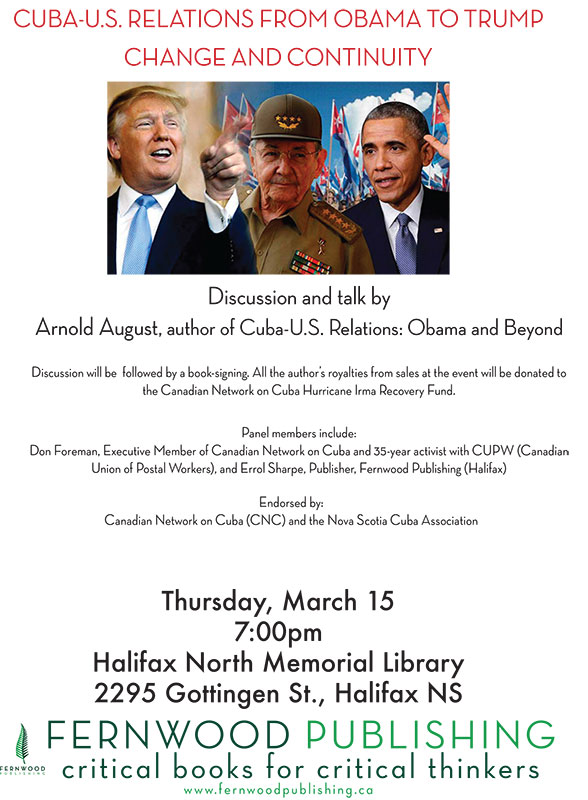

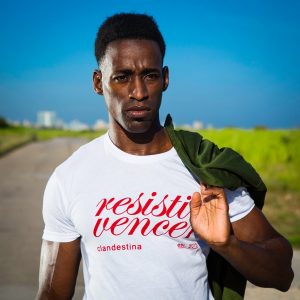
 This example, among many others, confirms the well-documented thesis regarding the war on ideas (or cultural war) in my book CUBA–U.S. RELATIONS. This T-shirt business and its owner were explicitly promoted by Obama during his March 2016 visit to Havana. The owners graduated from the Columbia Business School’s Entrepreneurship and Competitiveness in Latin America Program.
This example, among many others, confirms the well-documented thesis regarding the war on ideas (or cultural war) in my book CUBA–U.S. RELATIONS. This T-shirt business and its owner were explicitly promoted by Obama during his March 2016 visit to Havana. The owners graduated from the Columbia Business School’s Entrepreneurship and Competitiveness in Latin America Program.